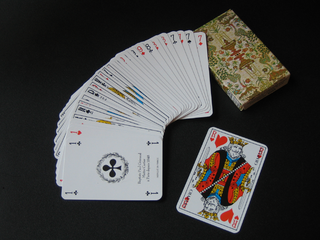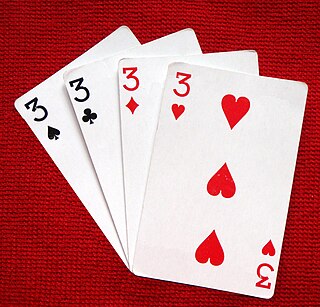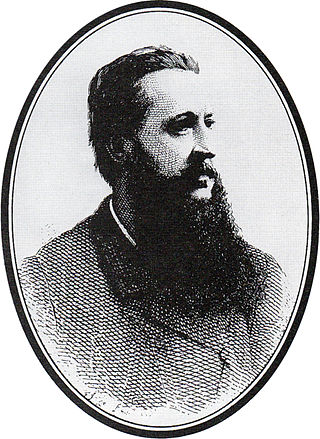Related Research Articles

Dominoes is a family of tile-based games played with gaming pieces. Each domino is a rectangular tile, usually with a line dividing its face into two square ends. Each end is marked with a number of spots or is blank. The backs of the tiles in a set are indistinguishable, either blank or having some common design. The gaming pieces make up a domino set, sometimes called a deck or pack. The traditional European domino set consists of 28 tiles, also known as pieces, bones, rocks, stones, men, cards or just dominoes, featuring all combinations of spot counts between zero and six. A domino set is a generic gaming device, similar to playing cards or dice, in that a variety of games can be played with a set. Another form of entertainment using domino pieces is the practice of domino toppling.

Whist is a classic English trick-taking card game which was widely played in the 18th and 19th centuries. Although the rules are simple, there is scope for strategic play.

Auction bridge was the first form of bridge where players bid to declare a contract in their chosen trump suit or no trumps. It was first recorded as being played in Bath around 1904. The Bath Club and Portland Club met in 1908 and issued a super-set of rules for Bridge that covered the bidding and penalty for failing to make a contract in Auction Bridge. Early forms were rudimentary and unbalanced and the British and Americans could not agree over the bidding ranking and use of artificial bids, resulting in The Whist Club of New York and The Portland Club issuing competing sets of rules.

Euchre or eucre is a trick-taking card game commonly played in Australia, Canada, Great Britain, New Zealand, and the Midwestern United States. It is played with a deck of 24, 25, 28, or 32 standard playing cards. There are normally four players, two on each team, although there are variations for two to nine players.

Piquet is an early 16th-century plain-trick card game for two players that became France's national game. David Parlett calls it a "classic game of relatively great antiquity... still one of the most skill-rewarding card games for two" but one which is now only played by "aficionados and connoisseurs." Historically also known as Sant or Saunt from the French Cent.
This article contains information about the literary events and publications of 1742.
Edmond Hoyle was an English writer best known for his works on the rules and play of card games. The phrase "according to Hoyle" came into the language as a reflection of his broadly perceived authority on the subject; use of the phrase has since expanded to any appeal to a putative authority.
Ruff and Honours, Ruffe and Trump or Slamm was an English trick-taking card game that was popular in the 16th and 17th centuries; it was superseded in the 18th century by Whist.
German whist is a variant of classic whist for two players in which the reward for winning the first 12 tricks is to add a particular card to your hand. Also called Chinese whist, it is probably of British origin.
Catch the ten, also called Scots whist or Scotch whist, is an 18th-century point-trick ace–ten card game that is recorded as being played only in Scotland, although evidence suggests a possible German origin. Unlike standard whist, it is played with a pack of only 36 cards, the fives and below being omitted. In the trump suit, the jack is the highest card. Despite its alternative name, it has nothing to do with standard whist.

Robert Frederick Foster of New York City, known as R. F. Foster, was a memory training promoter and the prolific writer of more than 50 nonfiction books. He wrote primarily on the rules of play and methods for successful play of card, dice, and board games. Alan Truscott wrote 20 years after his death that Foster "had been one of the great figures in whist and bridge" for 60 years.
The Lied Library building is located on the University of Nevada's Las Vegas (UNLV) campus in Paradise, Nevada. At 5 stories high and 302,000 square feet (28,100 m2), it is the largest building on the campus. The Architect of Record was Welles Pugsley Architects. It first opened on January 8, 2001. UNLV Libraries, established in 1957, includes other campus libraries: the Architecture Studies Library, Health Sciences Library, Teacher Development & Resources Library, and UNLV Music Library. UNLV Libraries has a collection of over one million volumes, access to over 20,000 online and print journals, and over 2 million additional resources of various media such as microfilm, DVDs, and government publications.
Hoyle Card Games is a Game Boy Color-only video game that was developed by Sandbox Studios and published by Sierra On-Line under their Sierra Attractions label.

Napoleon or Nap is a straightforward trick-taking game in which players receive five cards each and whoever bids the highest number of tricks chooses trumps and tries to win at least that number of tricks. It is often described as a simplified version of Euchre, although David Parlett believes it is more like "an elaboration of Rams". It has many variations throughout Northern Europe, such as Fipsen. The game has been popular in England for many years, and has given the language a slang expression, "to go nap", meaning to take five of anything. It may be less popular now than it was, but it is still played in some parts of southern England and in Strathclyde. Despite its title and allusions, it is not recorded before the last third of the nineteenth century, and may have been first named after Napoleon III.

Muggins, sometimes also called All Fives, is a domino game played with any of the commonly available sets. Although suitable for up to four players, Muggins is described by John McLeod as "a good, quick two player game".

Put, occasionally Putt, is an English tavern game first recorded in the 16th century and later castigated by 17th century moralists as one of ill repute. It belongs to a very ancient family of trick-taking card games and bears close similarities a group known as Truc, Trut,Truque, also Tru, and the South American game Truco. Its more elaborate cousin is the Catelan and Spanish game of Truc, which is still much played in many parts of Southern France and Spain.

Henry Jones was an English writer under the name "Cavendish", an authority on whist and other card games, tennis and other lawn games.
Edwin Cull Howell (1860–1907) was a whist player in America in the late nineteenth century, at a time when the card game bridge was evolving from the card game whist. He devised the movement system bearing his name, for cards and players first used in duplicate whist and subsequently in duplicate bridge. He was also an accomplished mathematician and chess player.
The Compleat Gamester, first published in 1674, is one of the earliest known English-language games compendia. It was published anonymously, but later attributed to Charles Cotton (1630–1687). Further editions appeared in the period up to 1754 before it was eclipsed by Mr. Hoyle's Games by Edmond Hoyle (1672–1769).
French whist is any of three different card games: whist as played in 19th century Paris; a variant of standard whist; and a purported variant of Scotch whist or catch the ten. It should not be confused with the term "French whist" when employed to refer to historical, cultural and ludemic aspects of whist as played in France.
References
- ↑ Levy, David (2010). "Pirates, Autographs and a Bankruptcy. A Short Treatise on the Game of Whist by Edmond Hoyle, Gentleman". Script and Print. 34 (3): 136. Retrieved 22 June 2011.